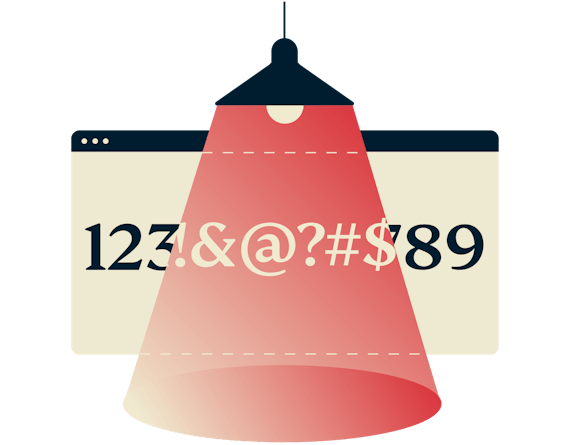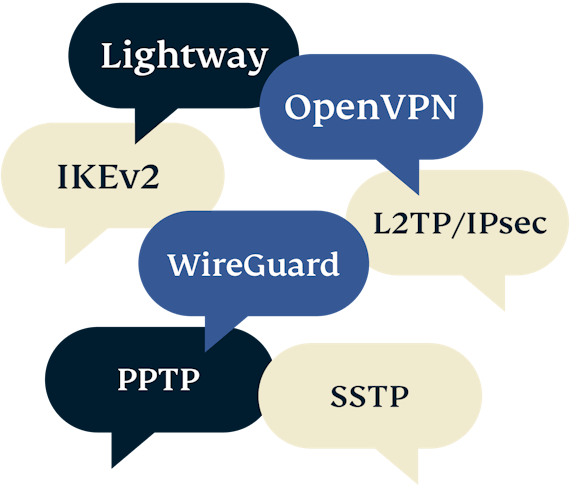- Home
- How Secure Is VPN Encryption? | ExpressVPN
Strong VPN encryption and security explained
VPN encryption is complex, relying on well-tested implementation of advanced mathematics. Read on to learn how ExpressVPN uses strong encryption to keep your data and communications safe.

Video: How VPNs use tunneling and encryption

How secure is ExpressVPN encryption?
Besides hiding your IP address and mixing your traffic with that of other users, ExpressVPN also encrypts your traffic between secure VPN servers and your computer. This keeps your data safe from being read by third parties.
ExpressVPN uses AES (Advanced Encryption Standard) with 256-bit keys—also known as AES-256. It’s the same encryption standard adopted by the U.S. government and trusted by security experts worldwide to protect classified information.

256-bit keys means 2^256 or 1.1 x 10^77 possible combinations. That’s 115,792,089,237,316,195,423,570,985,008,687,907,853,269,984,665,640,560,000,000,000,000,000,000,000,000 combinations! A brute-force attack on a 256-bit keyspace is simply infeasible, even if all the world’s most powerful supercomputers ran for as long as the universe has existed so far, billions and billions of times over.
VPN protocols: Lightway
ExpressVPN offers a variety of VPN protocols to implement strong encryption between your computer and the VPN server location you connect to. When you use the ExpressVPN app, you can easily switch between the protocols, although it’s recommended that you choose the automatic setting, which will select the protocol optimal for your speed and security.

In addition to offering a standard set of protocols, including OpenVPN and IKEv2, ExpressVPN built Lightway to outdo them all in speed, reliability, and security. Give it a try to see for yourself. Learn more about Lightway.
Here are some of the features of ExpressVPN encryption with Lightway:
Server authentication
Lightway connects over D/TLS 1.2, based on TLS, which in recent years has replaced SSL as the dominant standard of encrypting data in transit. Your browser and this server for example use HTTP over TLS (HTTPS) to encrypt the content of this web page. You can inspect the details of this connection by clicking on the lock icon in the browser’s URL bar.
Like HTTPS and OpenVPN, Lightway uses certificates to protect the user against man-in-the-middle attacks. With HTTPS, there are centralized registrars called certificate authorities (CAs). Their certificates are pre-installed by your operating system or browser, and any web certificate signed by one of these authorities will be considered trusted by your computer. In HTTPS, there are common standards to issue and revoke certificates, as well as to attribute the domains they are issued for to a specific owner.
Lightway does not rely on external certificate authorities to validate the authenticity of VPN server certificates. Instead, your VPN client has a certificate preloaded that is used to authenticate a VPN server.
When using an external or open-source Lightway client, you will be able to load this certificate yourself.
The two ciphers used in Lightway are AES-256-GCM and ChaCha20/Poly1305. Owing to the excellent hardware acceleration of AES available in most devices, Lightway will mostly default to this well-proven cipher. Only on lower-powered routers or entry-level mobile devices might ChaCha20 be used.
HMAC authentication
HMAC stands for keyed-Hash Message Authentication Code. A Message Authentication Code is a protection against data being altered in transit by an attacker who has the ability to read the data in real time. Out of many possibilities on how to reliably authenticate messages, TLS and OpenVPN use hashes (hence the H in HMAC).
Control-channel encryption
To ensure the integrity and confidentiality of encrypted data even on low-powered hardware, ExpressVPN uses AES-256-GCM. AES is one of the most widely used symmetric encryption standards, based on the Rijndael cipher developed by Belgian cryptographers Joan Daemen and Vincent Rijmen in 1998. The 256 refers to the fixed size of each encrypted block, 256 bits. GCM (Galois/Counter Mode) allows your computer to encrypt multiple packages at once, ensuring that your connection never hangs even for a short moment.
Data-channel encryption
Data-channel encryption protects against your information being visible to the parties that your data travels through. ExpressVPN uses a symmetric encryption scheme, in which the key is negotiated using the elliptic curve Diffie-Hellman key exchange. The ExpressVPN server and your VPN app use clever mathematics to negotiate and verify a secret key that is then used to encrypt the data for the entire session.
Ready to try the best encrypted VPN?
VPN encryption is essential. Give ExpressVPN a try. You’re 100% covered by our 30-day money-back guarantee.